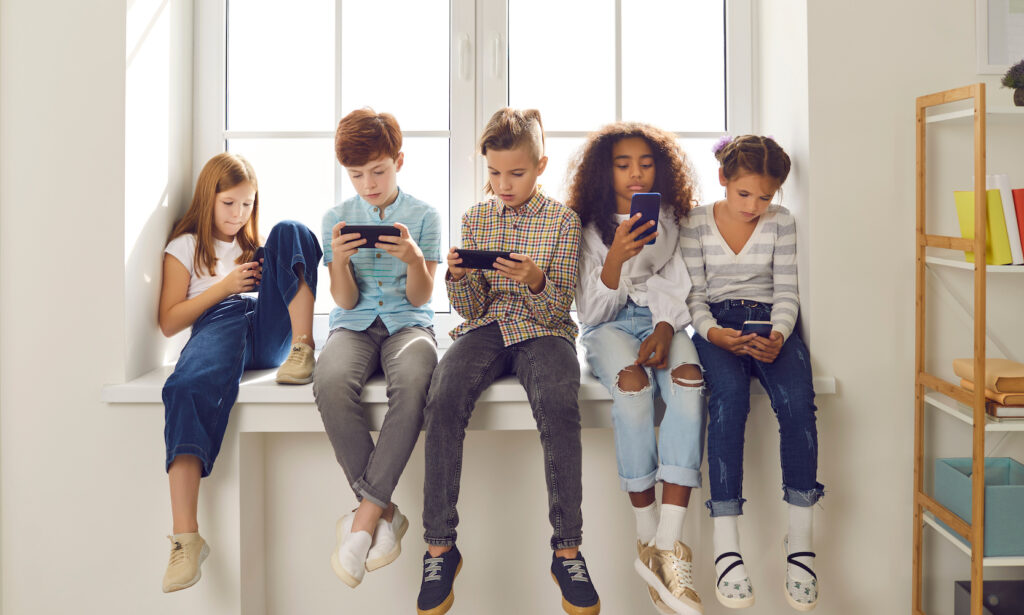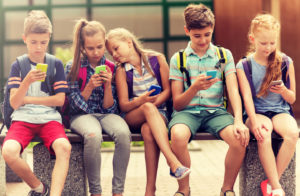Opinion: Let’s improve children’s mental health by protecting them online
As Gen Z began to mature, sociologists began to notice some startling trends they didn’t see among the Millennials, Gen X, or the Boomers before them. The teenage experience had been altered, and…

As Gen Z began to mature, sociologists began to notice some startling trends they didn’t see among the Millennials, Gen X, or the Boomers before them. The teenage experience had been altered, and not in a good way.
As NYU-Stern’s Jonathan Haidt notes:
“Around 2013, rates of depression, anxiety, and self-harm began rising rapidly for American adolescents. Those born in and after 1996 — Gen Z– have the worst mental health of any generation for which we have data (going back to the “Greatest Generation,” born 1900 to 1925).”
The data doesn’t stop with the hockey-stick-curve uptick in anxiety and depression. CDC data shows the majority of teen girls have persistent feelings of sadness or hopelessness and almost a third have seriously contemplated suicide. Nonfatal self harm rates among preteen girls have tripled since 2010. It’s not just girls either — tragically, the number of preteen boys and girls who have committed suicide has more than doubled since 2010.
So what happened from 2010-12 that so fundamentally altered the teenage experience? A New York University-led collaborative review of over 100 studies done on the subject points to social media as the causal force.
Beyond the behavioral harms the CDC is documenting, we’ve also seen studies that show the negative effects in opportunity costs (teens spend 7-9 hours of non-educational screen time a day — not much time for anything else), in social deprivation (65% collapse in time spent with friends among kids 15-24), in sleep deprivation (frequent social media use linked to less and poorer sleep), and in attention fragmentation, when kids are more concerned about what that notification was instead of what the teacher is saying. Perhaps not coincidentally, Missouri’s National Assessment of Educational Progress test scores peaked in 2009 and have been falling since.
Recently, we’ve seen the effects of this constant inundation and control of social media in the sudden surge of pro-Hamas rhetoric from Gen Z. When you only get your news from the Chinese-controlled algorithm on TikTok, and no longer have the critical thinking skills necessary to sort through the propaganda to find the facts, it’s no wonder they’re demanding safe spaces, disrupting city council meetings, smashing and defacing Jewish businesses and marching around holding signs with inconceivably vile rhetoric.
As parents, we’re being hemmed in and pressured from all sides by this societal tidal wave. If you ask almost any parent, they’ll agree that kids need less screen time – but the pressure from kids and their cool friends and media has worn parents down.
As policymakers, we need to focus on empowering parents to take back control and start addressing the causal factors of social media-created anxiety and depression, instead of just continuing to spend more tax dollars on the consequences.
This is why I took some of the best practices we’re seeing pass in other states and introduced HB 2157. This bill tackles the mental health crisis our kids are facing in four distinct pieces of action:
- Require K-12 schools to ban cell phone use during instructional time. This is a no-brainer and something many school districts are already putting into policy. But the policies are unevenly enforced, and they pit teachers against each other as some choose to enforce policies and others do not. I’m willing to make the state play the role of bad guy and require that school districts create and enforce no-phone policies. The early results across the nation have been positive.
- Require parental consent on social media accounts. According to the Federal Trade Commission, no one under the age of 13 is allowed to have a social media account. However, this measure is not enforced, and if the social media company doesn’t know you’re under 13 then there are no consequences. Let’s follow Utah’s lead and at least require parental consent for Missouri minor social media accounts. You, the parent, should be in charge of where your kids spend their screen time.
- Hold social media companies liable for addictive applications. A Wall Street Journal review of whistleblower documents shows that Facebook knew of the harm Instagram is creating in teenage mental health. Let’s empower the attorney general and parents to take action against social media companies that are not responsive to the more addictive features of their applications.
- Require age verification before accessing pornographic websites. Pornography has been shown to cause “various long-term deleterious effects on sexual maturation, sexual behavior, Internet addiction, and overall personality development.” The average age of initial pornographic consumption is 12, and 73% of teenagers report watching online pornography. Let’s take the next step alongside Arkansas, Louisiana, Mississippi, Montana, Texas, Utah, and Virginia and require age verification through a third-party upload of an ID.
Technology is always a disruptor, but generally is a positive force. Social media can do so much good when you get above the seedy underbelly. However, the unintended consequences of minors on social media are destroying children’s futures by wrecking their mental health, perhaps irreversibly.
I believe it is time we protect Missouri children’s mental health by taking these common-sense steps and re-empowering parents by passing HB 2157.



